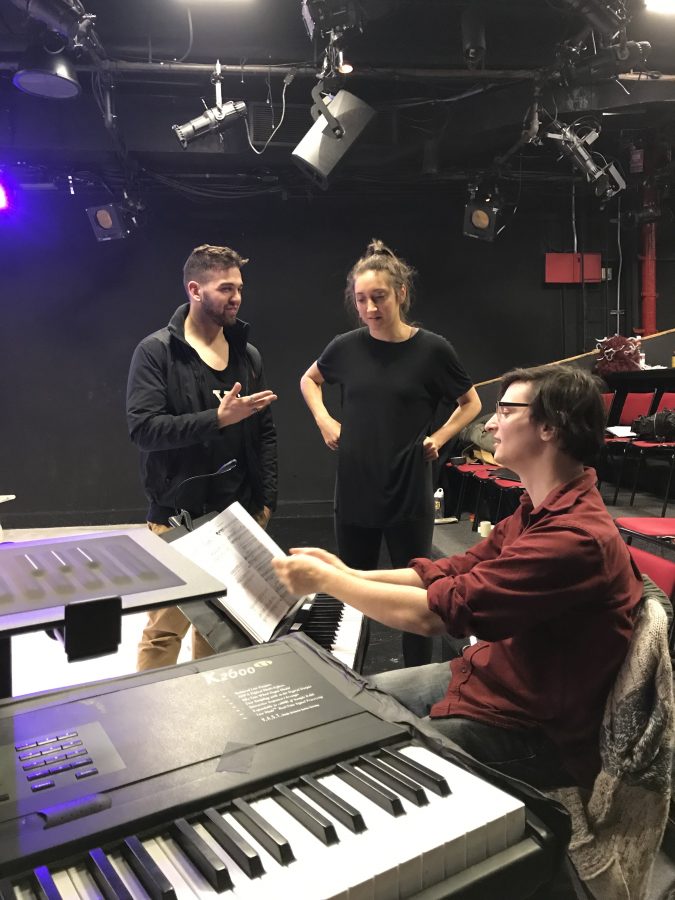“Medusa,” a new musical presented by Tisch Drama’s New Studio on Broadway, sheds light on how long humans have been grappling with assault at the hands of men in power. Based on the ancient Greek myth of a woman transformed into a murderous, snake-haired monster, the show turns the story on its head, focusing on its protagonist’s humanity as a survivor of rape.
The show, running through April 13 at the Frederick Loewe Theatre, was written in 2017 at the start of the #MeToo movement; it originated as a graduate thesis by Wes Braver and Rachel Dean, at the time students in the Tisch Graduate Musical Theatre Writing Program.
The story follows Medusa, played by Akilah Ayanna, a mortal and an outsider in Athens. Once Poseidon (Ray Fanara and Jack Brinsmaid), the god of the sea, rapes her, her life soon begins to unravel, and she is accused of crimes she hasn’t committed. In the original myth, the goddess Athena transforms Medusa into a monster with snakes for hair; she is later killed by Perseus (Javier Fox and Oliver Prose), son of Poseidon, who is revered for doing so. Braver and Dean interpreted the myth differently, writing the script to instead empower Medusa.
“During the summer of Brock Turner and Bill Cosby and everything, we were just shocked and outraged that a story that is this old is still so relevant,” Dean said. “So we kept that central tenet of Poseidon raping Medusa and then her being turned into a monster.”
Set in Ancient Greece with modern dialogue and music, “Medusa” is both authentic to its origins and relatable to a contemporary audience. The show utilizes a chorus like those found in ancient Greek drama, while its music incorporates elements of rock, pop and hip-hop.
Braver and Dean make sure to address the many facets of violence against women, including the racism that permeates the conversation about assault.
“We are tired of seeing violence on women’s bodies,” Dean said. “We especially are tired of seeing violence on black women. In our show, Medusa is always portrayed by a black actress. They’re always the sacrificial characters, that other character who’s dying to make people feel grief. It’s not really fair to them as characters or as humans.”
The musical is co-presented by Collaborative, Development & Production, an initiative that organizes workshop productions of new musicals from the Graduate Musical Theatre Writing Program. The show has gone through multiple workshops, but this is the largest production of “Medusa” yet — with a five-piece band, 23 cast members and an even more expansive crew. With earlier rehearsals before spring break being held in cramped rooms at Pearl Studios on Eighth Avenue, the process of putting together a show of this scale has been hectic.
“Everybody has carried themselves really professionally in this process,” Music Director Mark Evans said. “I think part of that has to do with the fact that everybody really cares about the show and thinks the show is very strong and important.”
Brandon Anderson, Artistic Director of CDP and Managing Artistic Director of the Tisch New Musical Theatre Workshop, has been integral to the progression of “Medusa.” He, along with Evans and Director Mia Sommese, selected “Medusa” for CDP’s summer workshop, where it went on to become a part of this year’s curriculum for New Studio.
Evans has loved watching the show come to life. The advanced tech and devoted crew have made Braver and Dean’s latest rewrite all the more larger-than-life. Braver, Dean and Evans all attribute much of the production’s vibrancy to set designer Anton Volovsek’s incredible work, each citing the marble floor as one of the many aspects they’re excited for.
“The crew is doing awesome. We’d be nothing without the incredible dedication of everyone involved,” Braver said. “I walk in and there’s 20 people doing work on this thing that’s been our dream for three years who I’ve never even met before.”
Braver can’t imagine the production without the creativity and insight of costume designer Kt Harris. Her neutral and cool designs for the chorus allow room for characterizing accessories that emphasize their transitions into soldiers, priestesses and other background roles.
One of the biggest changes made in their recent rewrite was an entire overhaul of the original ending.
Both Braver and Dean have undergraduate degrees in music, which allows them to share credit for both the music and the script. Their best ideas are born out of the tension from the intermingling of their responsibilities. Braver is even playing keyboard for the show.
“When we’re all looking for these answers together, we are bound to find more. We are all voices in this piece,” Braver said. “Musical theatre is inherently the most collaborative art form I feel.”
The show was partially inspired by central ideas of the essay “The Laugh of the Medusa,” by French feminist philosopher Helene Cixous. “The first was that men are afraid that women will laugh at them and women are afraid that men will kill them,” Dean said, “and then the other thing was, and I’m totally paraphrasing, but in order to evince change in society, we need to change the stories that we tell ourselves as a society.”
“Medusa” is running at the Frederick Loewe Theatre, 721 Broadway (Second floor), through April 13.
A version of this article appeared in the Monday, April 8, 2019, print edition. Email Aashna Agarwal at [email protected].























































































































































